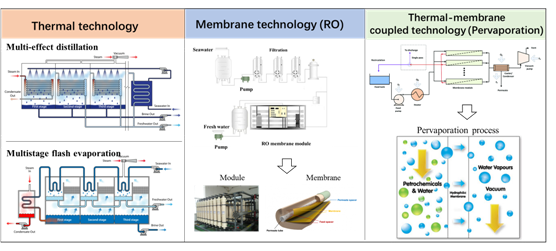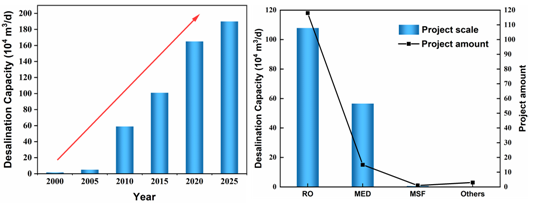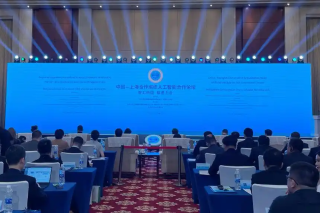Tianjin University develops material for ultrafast seawater desalination
Tianjin University has developed new material for ultrafast desalinating seawater, promising for the sustainable supply of fresh water from seawater desalination.
The university in Tianjin has collaborated with Nankai University and another three institutions to develop a new kind of membrane material,- covalent organic framework (COF), which exhibits high water permeation flux, high salt rejection and excellent fouling resistance. The relevant findings were just published in the journal Nature Sustainability.
The first author of this research article, Wang Meidi, a Ph.D. student at the School of Chemical Engineering and Technology, Tianjin University, had just passed his Ph. D thesis defense.
“I stayed for my research work during 2021 winter vacation. I felt energized and excited since our membranes had displayed desirable separation performance,” Wang said.

Illustration of three categories of seawater desalination technologies
Jiang Zhongyi, the leader of this research project, and a professor at the School of Chemical Engineering and Technology, Tianjin University, has been engaged in biomimetic and bioinspired membrane research for over 20 years. He said: “In our project, we adopted a new approach, the thermal-membrane coupled desalination technologies exemplified by pervaporation.”
According to Jiang, energy-conserving research is very promising in that it has combined the merits of two dominant desalination technologies at present in China: thermal-based technologies and membrane technologies.
The most significant innovation is material design. “In the past, seawater desalination usually uses the conventional polymeric materials, which are easily available and processable, but the desalination efficiency is relatively low. Now we employ a novel kind of material called covalent organic frameworks (COFs), which possess long-range ordered channels,” Jiang added.

Illustration of the scale growth of the nationwide seawater desalination project
Water scarcity is a major challenge for global sustainable development and billions of people lack access to safe fresh water. If seawater, which makes up more than 96 percent of the Earth’s total water capacity, can be transformed into fresh water, it is unquestionably a great solution to alleviate the shortage of fresh water resources.
“Desalinated saltwater used as drinking water is possible,” Jiang said, “But for now, it is too expensive for common and wide-spread usage.”
According to Zhang Zhenjie, professor at the College of Chemistry, Nankai University, the team is undertaking more extensive studies to put the scientific achievements into daily application as soon as possible.
“Our group is working on lowering the cost of the material, and we’ve been able to get it down to 0.1 yuan per gram. The other issue is how to realize large-scale production. Jiang Zhongyi and his group are working on it, and theoretically, scaling up is rather promising. As far as I know, the officials and experts from the Ministry of Science and Technology of China, as well as some enterprises, are very interested in our project and are working on the next steps to take this technology from the lab to the real applications.” Zhang said.

Copyright ©
Tianjin Municipal Government. All rights reserved. Presented by China Daily.
京ICP备13028878号-35



